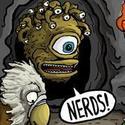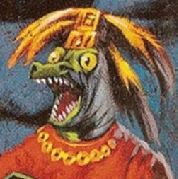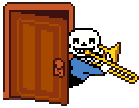|
As a quick, vague, and very general question... What are some ways that game systems deal with attack bonus, skills, saves/defenses, and/or their equivalents without using Ability Scores? I'm going kinda 25%-50% DTAS with my designs, so I want to see if there are more elegant alternatives that tickle my fancy.
|
|
|
|

|
| # ? Apr 26, 2024 06:00 |
|
Opposed rolls with skills (FATE style) is one way, or have target numbers/attack bonuses determined by skills (like some parts of Savage Worlds, which has ability scores but you wouldn't need that necessarily).
|
|
|
|
|
You can have them as completely independent skills everyone can learn as previously said, but you could also have them as attributes inherent to a class (either as fixed numbers, or as bonuses if you also want to make them independent skills) and you could also make them all increase depending on what cool stuff PCs pick up, so if you grab a bunch of sword-fighting powers/feats/whatever your attack bonus increases for instance.
|
|
|
|
TK-31 posted:you could also have them as attributes inherent to a class Bob Quixote posted:I was wondering if giving magic a low max damage cap but having it bypass damage reduction might be a fair way to use these effects since they can't get boosted? Weapon damage can get boosted by taking different "Power" slots, but I wanted each magic "Power" to stand on its own. I've already got lots of non-combat magic powers (Telepathy, Animal Speech, Illusions, etc.), but wasn't sure how exactly to design combat-only damage based powers that stood alone. Bob Quixote posted:There is a slight restriction difference in swapping between them since you need to have a weapon in your hand to use it, but to use magic you simply must have your hands free. About one round of delay I guess. The basic thing I'm trying to feel out is that while people don't have to specialise, at some point you're going to have someone who wants to go all-out Magic and someone who wants to go all-out Greataxe. Will they be able to have the same average level of functionality? If the Greataxe guy can take a power that allows him to affect people at range without going off theme, then setting the average magic damage to: (average weapon damage - average armour damage reduction) - (some arbitrary value for any other special effects) will work fine for balance. If they have to take a bow to affect people at range then magic will need average out to something like: ((average weapon damage - average armour damage reduction) - (some arbitrary value for any other special effects) - (average damage lost per combat to weapon switching/average number of attacks per combat)) Splicer fucked around with this message at 14:54 on Oct 15, 2012 |
|
|
|
Can anyone suggest some good alternatives (dice-based or not) to using percentile dice if I want to have straight-up 0% - 100% percentage range resolution mechanics?
|
|
|
|
Nope, but I can do you 0 to 99 or 1 to 100 if you want?
|
|
|
|
The Ender posted:Can anyone suggest some good alternatives (dice-based or not) to using percentile dice if I want to have straight-up 0% - 100% percentage range resolution mechanics? What are you trying to do? Percentile dice are probably the easiest method of getting a 1-100 number without getting an actual physical d100. Edit: Oh, you said 0 to 100. gently caress if I know. Comedy option: 
|
|
|
|
AlphaDog posted:Comedy option: (I laughed)
|
|
|
|
A hundred-card deck, the page numbers of a multiple-of-100 page book, some kind of wheel of fortune, this... zocchihedron, a stopwatch that counts from 0 to 99. And if you want style, there is only one option. 
|
|
|
|
Rulebook Heavily posted:A hundred-card deck
|
|
|
|
The player and the GM secretly write numbers between 0 and 100. Reveal and add, circling back to 0 if over 100 (eg 90 and 50 would be 39). Theoretically random but not due to human factors.
|
|
|
Splicer posted:Having them do lower base damage but ignore armour reduction is a decent way to keep them roughly balanced while having their own flavour. Be careful of scaling though, if dragons have a DR of 12 or something then you're not going to get a lot of stabbing in there. I was thinking of having DR stop somewhere around 3 or 4 for monsters and just giving the larger ones more HP that way they can still be damaged by non-magic attacks but allow for fights that last a decent amount of time. Players can get up to 5 in damage reduction wearing the heaviest armors and using a shield and such, but players aren't really expected to be fighting one another and they don't have much HP, so its just a method to help out survival against enemies. Splicer posted:By one round's delay do you mean they skip a turn, drop down initiative, give up a move action? Do you need both hands free to cast magic or will one free do? (as in, does moving from a sword to magic missile require you to swap out "sword" for "empty hands"?) I was thinking that both hands needed to be free to cast and of giving spells a slower initiative than a weapon attack. Drawing a weapon from your "backpack" (the abstract name for the items in your inventory which aren't in your hand) takes up a move action. Splicer posted:The basic thing I'm trying to feel out is that while people don't have to specialise, at some point you're going to have someone who wants to go all-out Magic and someone who wants to go all-out Greataxe. Will they be able to have the same average level of functionality? A guy who specializes in Greataxe would have to take a bow to affect targets at range, so I suppose I'd need to use the second formula since he'd lose an action readying a bow or whatnot. The numbers between someone specialized in a particular weapon and someone just casually using it are very different though. A guy who just picks up an axe makes a single attack for 1-10, no bonuses or penalties. A guy who is skilled in its use, who has taken the Weapon Master- Axe ability & who is using a weapon in their off hand can make 2 attacks with the axe as well as an attack with the other weapon all in one round (7 - 30 damage). Of course if one spell that occupies a single "Power" slot does equivalent damage to someone who spent several of those same slots to improve their weapon ability that makes investing in a weapon a more expensive prospect than taking a single spell. There are 12 magic powers in the game so far and only 2 of them actually do any damage; the other 10 mostly have either narrative effects or indirect combat applications. A character specializing in Magic would have at most 3 of these abilities and could certainly do some interesting things with them but wouldn't be the combat powerhouse that someone specializing in weapons would be. Maybe thats for the best though? Does magic have to have a place in combat, or am I just trying to make it fit for the sake of tradition and am just unaware of how I'm limiting my thinking?
|
|
|
|
|
Bob Quixote posted:Maybe thats for the best though? Does magic have to have a place in combat, or am I just trying to make it fit for the sake of tradition and am just unaware of how I'm limiting my thinking? I think a more interesting idea might be to remove any combat magic, and stick with the non-damaging but narrative control ones. and allow them to be cast with like, a shouted word. (no need to unequip or re-equip weapons mid scene) this way, everyone has to take at least some kind of weapon, magic can be cast by anyone, and nobody has to lose a turn in combat. also, if you do keep damaging magic, make it baked into the setting that the only damaging magic you can have must be cast out of combat and contained in a weapon. (this may help you keep the 12 powers you already have, but also keep balance)
|
|
|
Error 404 posted:I think a more interesting idea might be to remove any combat magic, and stick with the non-damaging but narrative control ones. and allow them to be cast with like, a shouted word. (no need to unequip or re-equip weapons mid scene) I'm fully on-board with a lot of those ideas. I'll just stick with non-damaging magic Powers that have narrative based effects. The more I think about it the more I realize these aren't so much "spells" as they are super-powers since they are a quality inherent to that character which they can use whenever they desire and don't learn from books (within the fiction). In terms of damaging magic applied to weapons, the game does include an Alchemy skill that allows characters with the skill to brew up all sorts of nonsense which includes various oils that can be applied to weapons for different effects. Unlike magic powers though you can't prepare them on the road since you can only carry so much stuff on you at a time and it requires rare ingredients (i.e. money). Its also impossible to just load yourself up with tons of potions since the abstract Inventory space that all characters have is limited to 10 items, and that includes things like the food they eat to survive and their weapons and other equipment.
|
|
|
|
|
Ulta posted:The player and the GM secretly write numbers between 0 and 100. Reveal and add, circling back to 0 if over 100 (eg 90 and 50 would be 39). Theoretically random but not due to human factors. This is actually a really fun idea, because it introduces a bit of gambling/psychology to it ("will he choose high or low?"). Simple, too . . . just slower than dice.
|
|
|
|
Another question I would like to pose to the forums: What would be YOUR core classes? I know D&D traditionally has 4, but I don't expect peoples' answers to be limited to that. It doesn't have to be an exact class name, either, it could just be a concept or idea. For example, before the Demon Hunter for Diablo 3 was released, someone extrapolated that the fifth class would either be a "dark archer" or something resembling a druid, based on the archetypes that were already covered (Barbarian is heavily-armored, strength-based, melee; Monk is dexterity-based, holy, lightly-armored, etc.)
|
|
|
P.d0t posted:Another question I would like to pose to the forums: I think it really depends on the kind of game that is intended since the classes would shape peoples expectations of how the game is played. D&D has general classes since its a pretty generic system designed for players to either make their own setting or use an existing setting which was designed around the generic core system. If you design a game starting with the setting and building the rules out from there the sorts of core classes you'd come out with could be very different, and might be designed to build up the fluff or put the player in a certain mindset. Then it also comes down to what you want the players to be doing in the game itself and what tools you want each class to have in order for the players to succeed at accomplishing these goals. You'd want to prune out any classes that are either useless or given too much narrative control to the point where other players actions become redundant. I really liked the idea behind the rules for Warrior, Rogue, Mage which is a freeware dungeon-crawl type game that is classless, but instead has those three archetypes as your Stats and you can choose to specialize in a particular role or spread your points around to be a more general character who can do a little of everything. Execution-wise its a little wonky in parts, but its a really cool concept and I want to try and so something somewhat similar with my own game.
|
|
|
|
|
As much as there seems to be a stigma against videogames (even among non-grogs) I actually like the 'roles' that 4E and some videogames use. Striker (or DPS if you wanna be Defender Controller Tank etc. and even in classless systems I generally try and get folks to choose a role, and then flavor their characters based on it. it's a tiny piece of metagame that I think can help players fit themselves into the conceptual space of the group, and make sure everyone has a built-in "spotlight". My personal fave as a player, Magical Strikers.
|
|
|
|
To answer my own question, I think there are a few archetypes/tropes that should be represented in the core. Some overlap when you look at traditional classes, so I'll give a few examples (tack on any applicable prestige classes/PP/ED as you see fit).
2. Light Melee (DEX) - Sort of comes in 3 flavours: a) Rogue, Thief, melee Bard; b) Monk, Avenger; c) Assassin, Shadowdancer 3. Arcane Mage - Wizard, Sorcerer, spell-focused Bard 4. Divine Mage - ranges in armament/melee capability and spell utility, from Paladins to Clerics to Invokers to Priests 5. Dark Mage - Warlock, Necromancer, Witch Doctor, Blackguard, Shadow Priest 6. Archer - Rogue (Diablo 1,2), Amazon (Diablo 2), archer Ranger, Hunter (Essentials, WoW) 7. Nature Mage - particularly dealing with summoning/controlling plants/animals, such as Druid, Shaman, Ranger As far as roles go, I think 4e did a decent job covering a lot of bases with role+power source combinations. I also think some of these templates could overlap (Archer + Nature Mage possibly being the most obvious) but there are some abuses that could crop up when you mix in roles (Archer + Defender being the go-to example). Conversely, I think you could easily apply Striker, Leader/Healer, or Controller to any of these templates. And layer in "Skill Monkey" over top, as desired.
|
|
|
|
P.d0t posted:Another question I would like to pose to the forums: Depends on what I'm going for. At the moment, I've been getting a kick out of Dungeon World and Old School Hack, and inspired by those two I'd like to try my hand at something that has similarly focused design but with an old-school coat of paint. For this project I'd probably go with Basic D&D's seven (i.e. the core four plus the traditional demi-human races as classes). However, another idea I've been bouncing around in my head for the longest time would be a fantasy RPG where everyone is some type of an elementalist. Each class would exist at the intersection of one of 4e's combat roles (Controller, Defender, Leader, Striker) and one of the classical elements (Air, Earth, Fire and Water). Alternately, I'd just treat your attuned element more like race, but also as a means of giving your combat powers alternate trappings. I'd probably go one further and divorce combat role entirely from out-of-combat mechanics, so beyond your character's combat role and elemental trappings you'd be free to choose your character's out-of-combat abilities. Actually, now that I think about it, I would further add a character's out-of-combat role as a separate axis for character customization, and because I like the symmetry of four elements and four combat roles, I'd probably have four of those as well. I can immediately think of Explorer, Scholar and Socialite (and I'm not even sure about those), but what would the fourth be?
|
|
|
|
Ratpick posted:I'd probably go one further and divorce combat role entirely from out-of-combat mechanics, so beyond your character's combat role and elemental trappings you'd be free to choose your character's out-of-combat abilities. I always get confused by the fact that people here seem to agree that Combat Class Should Not Equal Noncombat Role, yet they often want both minigames to run off the same mechanical engine 
|
|
|
|
P.d0t posted:I always get confused by the fact that people here seem to agree that Combat Class Should Not Equal Noncombat Role, yet they often want both minigames to run off the same mechanical engine If combat and out of combat are two completely different systems it removes the "eh, just roll a d20 get high" approach to winging it. If combat is (resolution mechanic)->(determine result) and out of combat is "(same resolution mechanic)->(determine different kind of result), if you want to slug someone in the middle of a conversation or talk during combat it's much easier to slot them in and make a balanced and reasonable call than if the two resolution mechanics are difficulty to compare. Finally, it's much easier to teach someone a game if they only have to learn one core mechanic. They don't have to be identical, 4e doesn't need social interaction to be grid based, but having the basic "Roll a 20 add a number get higher than X" core mechanic be the same across all situations was one of the best changes between AD&D and 3.x. Splicer fucked around with this message at 23:25 on Oct 17, 2012 |
|
|
|
Is there any sort of general opinion on percentile systems? The concept was a big deal when it came out. I don't have anything against them, but I found that I have never felt really intrigued or excited by a percentile-based system. They're like a old Volvo; they do their job and don't give you problems, but they're a little clunky and certainly not sleek or elegant. I remember the last time Chaosium released a new version of their BRP corebook and some posters on RPGnet were excited; my reply was "How do you get excited about BRP?" From a design standpoint, the main problem you run into with percentile systems is that it's way too cumbersome to run everything (like say hit points) on a scale where it's appropriate to measure results in 1-100 without a computer doing the work for you, so at some point you need to bring other polyhedral dice into it or have a chart that converts results into something smaller-scale. I don't think I've ever encountered a percentile system that didn't have something I considered weird and clunky, like BRP's Size attribute.
|
|
|
P.d0t posted:I always get confused by the fact that people here seem to agree that Combat Class Should Not Equal Noncombat Role, yet they often want both minigames to run off the same mechanical engine Its like Splicer said, its easier for players if they only have to learn one set of basic mechanics to play the game and so keeps play from getting bogged down. In my own homebrew I wanted to avoid D&D's rats nest of numerous weird subsystems as much possible so the mechanics for combat and non-combat actions are all based on a simple roll-under mechanic. I'm with Ratpick on divorcing combat and noncombat abilities from one another, but I prefer classless to class based systems as it is and thats sort of the heart of that kind of game anyway.
|
|
|
|
|
Halloween Jack posted:Is there any sort of general opinion on percentile systems? The concept was a big deal when it came out. I don't have anything against them, but I found that I have never felt really intrigued or excited by a percentile-based system. They're like a old Volvo; they do their job and don't give you problems, but they're a little clunky and certainly not sleek or elegant. I remember the last time Chaosium released a new version of their BRP corebook and some posters on RPGnet were excited; my reply was "How do you get excited about BRP?" Percentile makes it easy to model things in, because the way things are designed and read in it is fairly elegant. That's the theory. In practice they are super fiddly and really hard to balance because of how swingy the core resolution mechanic is.
|
|
|
|
TK-31 posted:Percentile makes it easy to model things in, because the way things are designed and read in it is fairly elegant. That's the theory. In practice they are super fiddly and really hard to balance because of how swingy the core resolution mechanic is.
|
|
|
|
Isn't the "swinginess" the same as most systems where you're rolling a single die, just with much greater granularity? Granted, roll-under is not the same as roll-and-add.
|
|
|
|
Halloween Jack posted:Isn't the "swinginess" the same as most systems where you're rolling a single die, just with much greater granularity? Granted, roll-under is not the same as roll-and-add. It pretty much is, actually, unless you have roll-under-half mechanics or something. "Roll under x on d20" is the same as "roll d20 and add x to beat DC21". The only difference is that skills are usually assumed to be bounded in a roll-under system. And yes, the swinginess of a d100 is exactly the same as that of a d20. EDIT: Oh, opposed rolls are different as well, I guess, since roll-under systems often require one or both parties to beat a fixed difficulty as well as the opponent's roll in order to succeed. Zandar fucked around with this message at 14:18 on Oct 18, 2012 |
|
|
|
d100 allows for more margin of success/failure, which I'm personally a fan of.
|
|
|
|
Percentile systems: I had an idea a while ago that never went anywhere. It had a "roll under" d100 resolution for everything, with lots of modifiers, so you could "easily" see your percentage chance of success. I say "easily", but after you hosed around with the modifiers for various things, the whole system was horribly unwieldly so I dropped the idea. Then I went for a system where you added ability score + skill + d20 roll and compared it to a target number from 1-100. The idea was that 1-100 is a loving easy way of expressing things "the average human could do this 50% of the time", "a skilled warrior should succeed 90% of the time". I lost interest though. But I'm still working on that thing I mentioned a few pages ago. --- Core classes? I went with Physical, Arcane, and Spiritual (or Divine, haven't decided yet). You pick a Primary one of those and a Secondary one. Most of your "at-will", or common moves come from your Primary thing at first. Your Big Special Moves come from your Primary or Secondary thing, with no obligation to ever learn anything from your Secondary. The theory is that you build "classes" or archetypes, or whatever from the blocks there. So some possibilities are: Physical with nothing in secondary: Fighter, thief. Arcane with nothing in secondary: Wizard, sage. Spiritual with nothing in secondary: Healy/smitey priest, weird psychic monk. Physical/Arcane: Tolkienesque elf warrior, magic assisted sniper, or maybe D&D wizard/thief. Arcane/Physical: Classic D&D fighter/wizard or maybe wizard/thief. Physical/Spiritual: Paladin, tribal war shaman. And so on.
|
|
|
|
Yeah, I find percentile roll-under ridiculously intuitive personally (of course there are always ways for things to get janky), but it's as much that I like to have fun with that level of granularity. Succeeded, yes, but by how much? What does that mean for how the action was carried out? I feel kind of like a fortune teller sometimes if I'm looking at a percentile result that 'feels' ambiguous and trying to interpret what that 'maybe' means. Of course you can scale that down easily enough to another die size too, it just feels 'right' as a percent to me. This has been a 'message' from the 'Council' for 'Superfluously' Encasing 'Words' in Single-Quotes. 'Donate' now for your 'free' tote 'bag'!
|
|
|
|
The Unknown Armies percentile system is super intuitive and seems to work well with hit points and such.
|
|
|
|
In answer to this:P.d0t posted:What would be YOUR core classes? And in specific response to this: Error 404 posted:As much as there seems to be a stigma against videogames (even among non-grogs) I actually like the 'roles' that 4E and some videogames use. All of those "roles" are "does a thing in combat", which implies to me a game that is very slanted towards spending a significant amount of time in combat encounters. I prefer to think of "roles" in terms of A-Team roles, or encounters type specialties. For my classless DW/D20-light mashup, I use five 'skills' as effective class-levels in what my "core classes" would be: Combat - "The Brawn" who is good at physical confrontation Movement - "The Acrobat" who is good at sneaking around and getting into places Exploration - "The Sleuth" who is good at investigating and figuring things out Social - "The Face" who is good at social interaction and fast-talking Creative - "The MacGuyver" who is good at creating and rigging devices
|
|
|
|
neongrey posted:Yeah, I find percentile roll-under ridiculously intuitive personally (of course there are always ways for things to get janky), but it's as much that I like to have fun with that level of granularity. Succeeded, yes, but by how much? What does that mean for how the action was carried out? I feel kind of like a fortune teller sometimes if I'm looking at a percentile result that 'feels' ambiguous and trying to interpret what that 'maybe' means. I'm of the opinion that "if you want something to happen 1% of the time, you really just want it to happen 0% of the time" d20 in theory would be great if each number (i.e. 5% interval) on the die did something different, but instead, it's still binary pass/fail, with crits thrown in at either end. What I'm trying to do in my game is use a smaller attack die (started with d10 but mulling d6 atm), but have certain numbers result in sort of... cascading crits? Basically, when you resolve an attack, go through this checklist: 1) Did you roll X,Y, or Z number? congrats, you "autohit", even if you rolled lower than the DC. Proceed to Step 2. 2) Did you beat the DC? congrats, your autohit does max damage. Proceed to Step 3 3) Did you beat the DC by 10 or more? congrats, your autohit bypasses DR. It isn't really elegant, but it adds some fun options beyond pass/fail without turning into RoleMaster. I also have ideas for some powers/abilities that step up the scale, either by giving you Step 2 or 3 automatically, or say, if you meet all 3 criteria, the attack becomes save-or-die or "just die, k?"
|
|
|
|
Oh sure, and I'm not a fan of the 1% chance of whatever, and in a truly practical sense if it's not the dividing line between yes/no, there's no real difference between a 49 and a 50, eg. It's something I like best when you only have the pass/fail points marked on the scale and the result itself creates the fuzz. It seems silly to use basically the most precise reasonable die roll as a vehicle for ambiguity, I'll admit, but I like mapping as few results to predefined possibilities as possible, and it's ultimately a stylistic preference. And not necessarily a reasonable one, to be sure.
|
|
|
|
Re: Roles I would like to see "roles" as something you layer onto your character, the same way you do backgrounds/themes/feats/feat chains/talents/etc. Roles should be divorced from class, ideally. So it would be like: * Class: How you fight/do damage (melee weapons, ranged weapons, spells, summons) Alternately, this could be defined as simply a function of powers and equipment proficiencies. * Combat Role: How you alter the fight.
-Defenders being a sort of specialized form of controller which causes the enemy to make sup-obtimal decisions, and soak damage -Leaders/Healers/Support keeping their allies in the fight or making them fight more effectively. -Strikers can be the "simple" choice for people who just want to do more damage, rather than get deep into strategy and tactics as the other roles require. This choice has to be player-driven, in the sense that it isn't the "well we need a DPS so you get to play the babby class." * Non-Combat Role: what you are best at, uh, out of combat. Basically, this boils down to skills, whether you're talking about Exploration, Social, or Movement. I liked how 4e gave each class The Skill That They Should Obviously Be Good At for free, but class skills should have been thrown out; give Arcane classes Arcana, Divine classes Religion, Fighters Athletics or Endurace, Rogues Stealth or Thievery, etc. Beyond that, though, you should be able to pick X number of skills from the list to flesh out your character, and tell the narrative you want your character to portray. If you want a Stealthy, Intimidating Wizard; an Acrobatic, Diplomatic Fighter; or a Cleric who can follow tracks and find hidden doors, go nuts. And then tie it all together with whatever reskin/flavour/narrative you want, to make it coherent and tell your story. --- DTAS chat: However, if your Class determines the ability scores you will have to use to be effective in combat, then Skills must be divorced from ability scores in order for this to work. If you are going to use ability scores, they should probably fuel either Skills OR Combat Powers, but not both; otherwise you end up pigeon-holing your Non-Combat Role with your Class choice. The issue with ability scores is the "Cleric Religion" problem, where your primary stats don't align with your primary skills. If you have the option to stack ability mods and skill points/training, it becomes necessary to do so; your DCs will be balanced around the assumption of someone who is "good" at the skill having both. If you allow one or the other but not both, and adjust the expected DCs downward accordingly, this alleviates the problem. P.d0t fucked around with this message at 00:20 on Oct 19, 2012 |
|
|
|
Error 404 posted:As much as there seems to be a stigma against videogames (even among non-grogs) I actually like the 'roles' that 4E and some videogames use. Nanoha Strikers.  Those kinds of roles are better served in the background and used to give the designer conceptual bounds, unless they are superclasses that you put other things under. And actually meaningful, of course. For instance, being a Striker has to mean more than "doing damage" when everyone does similar damage. I've noticed something blindingly obvious; people don't like rules. Not just in a D&D loads of pointless poo poo sense, but at all. With the rise of storygames and the generally memorable poo poo either involving fudging of the rules or involving them on the most primal level, it really does seem like the platonic ideal of elfgaming is improv with intermittent dice chucking. And yet, surprisingly few people want to cut out the middleman and play Fiasco or something. It could be the ingrained idea of D&D, but that didn't stop White Wolf and a lot of people don't grok D&D, then get mad when you show them the guts. Hell, even the progressive heartbreakers hearken back to blissful ignorance. Not saying this is a bad thing (I love my improv games), just that it's A Thing.
|
|
|
|
Yeah, I love storygames and 'improv with occasional dicechucking' above all else. But I find myself liking a subjective amount of crunch most of the time. My first ever experience was in some Palladium generic fantasy (hated it) and then abortive attempts at 2E, and 3E over the course of middle school. It would be fair to say I actually hated tradgames at this point, they were lame and only assholes played them. Then in highschool I was introduced to WoD, and sudddenly it all made sense and became the greatest thing ever. So, I guess that, much like a lot of folks' love of d20, I have a deep abiding love of the abomination of almost storygame/minor crunch that is various flavors of WoD. And as much as I love things like FATE, PDQ, Fiasco, etc. My personal gaming 'sweetspot' that I find myself returning to time and again is WoD.
|
|
|
|
oWoD hits that platonic ideal almost out of necessity, I feel. The books tell you to mostly ignore the crunch for your ~*story*~, which is good because holy gently caress old Storyteller system does not make a hell of a lot of sense. I always assumed that was why it is the de facto LARP game and one of the reasons people didn't like nWoD (the second reason is nWoD hosed up the fluff, too). It seems to come down to this: players want options, players need structure, players hate complex rules. oWoD has a lot of loving options and a strong enough structure through splats, the Willpower mechanic, and dots that the rest can be eyeballed. It also has weird poo poo that gets excised, houseruled or ignored. MadRhetoric fucked around with this message at 18:23 on Oct 19, 2012 |
|
|
|

|
| # ? Apr 26, 2024 06:00 |
|
So, with the intention of streamlining and making consistent "rules of thumb," I am considering using keywords for attack/power types that also define the action and frequency used. For example:
"all Summon Spells are Minor Action-Daily Powers" "all Buffs/Healing Spells are Minor Action-Encounter Powers" As you might guess, I'm not using a "balanced" power progression structure as in 4th Ed. I'm also leaning towards a sort of neo-Vancian system; probably no at-will powers (except for basic attacks) but have the number of usages of Encounter and Daily powers increase as you level up your powers. Is this "too much streamlining," or is having one Keyword encompassing AWED and Action-type a workable, helpful idea?
|
|
|

























